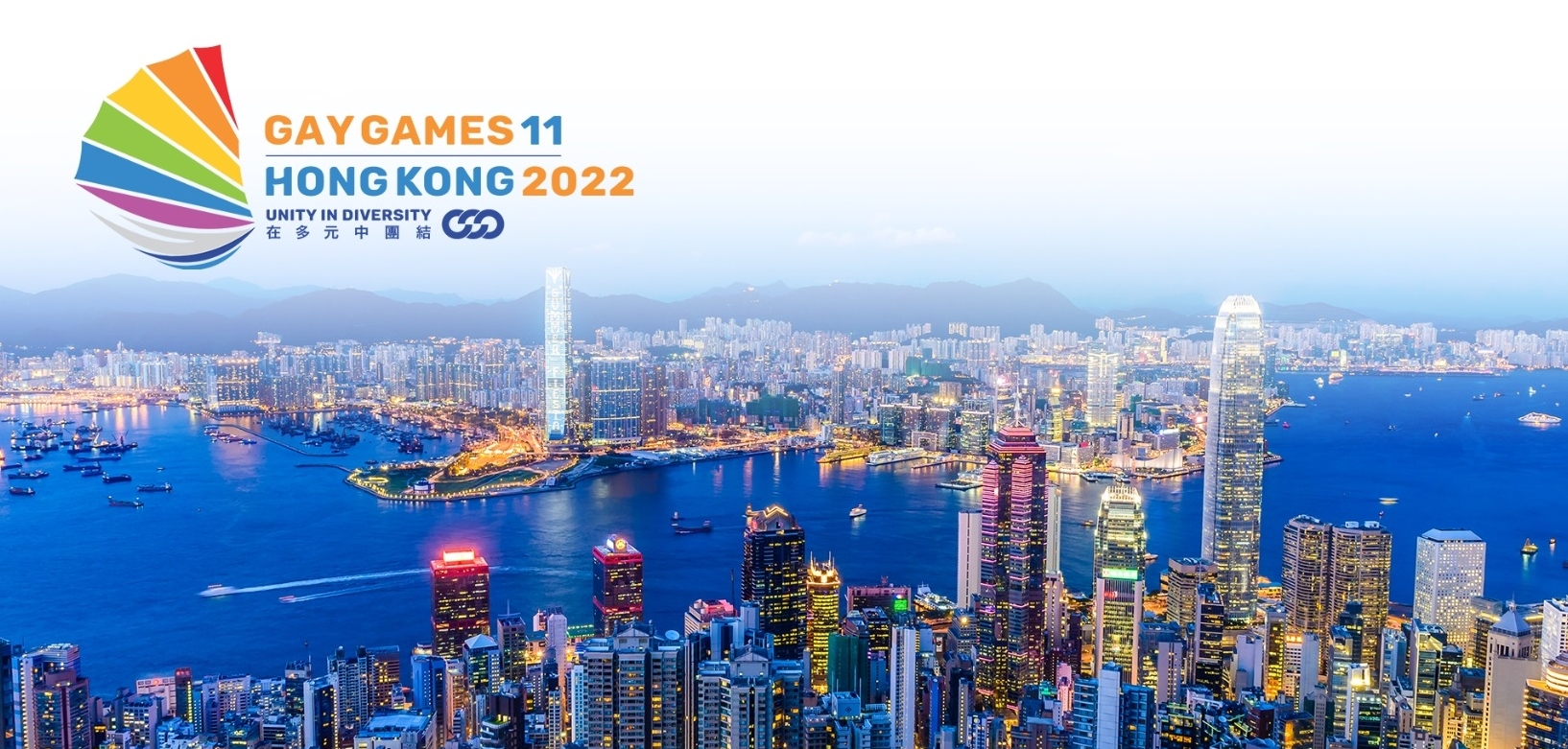By Kristie Wong
Hong Kong, 9 July 2021: In November next year, Hong Kong will become the first Asian city to host the Gay Games. First staged almost 40 years ago, the event has grown from humble beginnings into the world’s largest all-inclusive sporting spectacle. Adhering to the motto “Unity in Diversity”, everyone is welcome to participate regardless of ethnicity, religion, age, sexual orientation, gender identity, ability, or background.
Hong Kong fended off strong competition from 10 other cities for the hosting rights. Organisers are expecting 12,000 participants (in comparison, the 2016 Rio Olympics featured just over 11,200 athletes), 75,000 spectators and 3,000 volunteers from 100 countries. There are 36 different sports being contested, plus opening and closing ceremonies, a festival village and multiple arts and culture happenings.
Supported by the Equal Opportunities Commission, BrandHK, InvestHK and the Hong Kong Tourism Board, the Gay Games will have an estimated economic impact of HK$1 billion (about US$128 million), comprising 300,000 hotel room bookings and associated consumption revenue. After the much-publicised civil unrest of 2019 and amid ongoing social tensions, this global-scale event will showcase Hong Kong’s positive qualities as a modern, dynamic and inclusive city. What’s not to like?
Plenty, according to some decidedly conservative lawmakers who fear our society will be corrupted. Legislative Councillor Junius Ho called the Gay Games “disgraceful” and branded any revenue generated “dirty money”. His colleague Priscilla Leung said the government should stay neutral and withhold support towards pro-LGBTQ+ movements. She warned the impending sporting and cultural festival would attract “the opposing voice” and “tear society apart”. Another lawmaker, Holden Chow, said hosting the Games could give rise to “social disputes” over LGBTQ+ issues.
Sadly, such sentiments are not unfamiliar to the ears of Hong Kong’s LGBTQ+ community. The development of their equal rights in this city is piecemeal, at best, relying on individuals bringing discrimination claims before the courts, often at great cost, as the government avoids taking a proactive approach. To highlight this unsatisfactory state of affairs, a report initiated by the Equal Opportunities Commission (EOC) two years ago identified nearly 100 ways that people in same-sex marriages and LGBTQ+ partnerships are treated differently under Hong Kong law.
Wylie Yeo, Director of the Hong Kong Pride Parade, rightly observed the three legislators were “out of touch” and that their remarks would have a negative impact and cause more prejudice towards the LGBTQ+ community. EOC Chairman Ricky Chu called the lawmakers’ comments “inappropriate” and added: “We hope society can stop the stigmatisation and uphold the values of equality and respect.” One would have hoped for a stronger response from the EOC considering these were blatantly discriminatory remarks made by people holding public office.
Boase Cohen & Collins, I’m proud to say, has a strong record of assisting the LGBTQ+ community in seeking equal rights and combating discrimination. Aside from advising and acting for individual clients, we are a sponsor of Hong Kong’s annual IDAHOT – the International Day Against Homophobia and Transphobia.
The lawmakers’ regrettable comments came during a Legislative Council meeting at which it was reported Gay Games organisers are having trouble booking venues. Almost two-thirds of the 56 proposed venues are government-owned and organisers are having difficulty securing them 16 months in advance due to red tape. Under current rules, they must go through the city’s 26 National Sports Associations to book venues early, but some are refusing to help since they are not directly involved in staging the events. The organisers insist that without confirmed venues, they cannot open registration for participants.
Our city’s Chief Executive, Carrie Lam, issued a rare rebuke to the legislators, all members of the pro-establishment bloc, and pledged government support for the Gay Games. “It is regretted that in the course of discussing this question in the Legislative Council individual members have become a bit emotional in expressing their view,” she told reporters. “I certainly personally, and as the Chief Executive, do not condone those sorts of remarks by individuals, which will unnecessarily divide society and even raise hatred among certain sectors of the community.”
While the Chief Executive’s remarks were welcome, she stopped short of making special provision regarding venues. As a locally registered organisation, the Games can only book non-peak and peak slots at government sports facilities up to six months and three months in advance, respectively. Secretary for Home Affairs Caspar Tsui says his department will help process applications and will try to meet organisers to see what assistance can be offered under the existing procedures.
Any impartial observer might ask why the government can’t simply block-book venues for an event which will promote Hong Kong as a world-class city that accepts sexual diversity, unity and inclusion. With the Gay Games only 16 months away, the government should at least be providing additional assistance to secure the sports venues ahead of time.
An Associate with BC&C since 2017, Kristie Wong is a core member of the firm’s Family Law department where she deals with a wide variety of cases arising from the matrimonial context while she also handles Criminal Matters. She can be contacted at Kristie@boasecohencollins.com.



